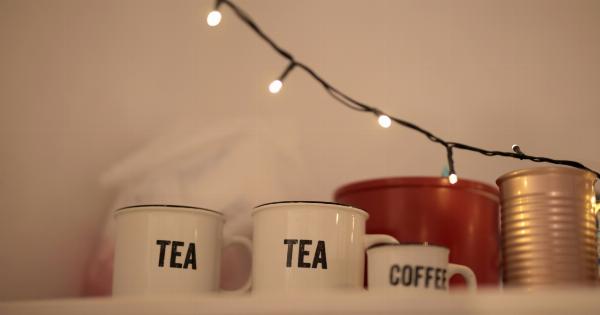Drinking fluids is essential for maintaining proper hydration levels in the body. Among the various beverages, coffee and tea are widely consumed around the world.
However, there has been a long-standing debate regarding whether drinking coffee or tea is bad for hydration. In this article, we will explore the effects of coffee and tea on hydration and determine whether they are indeed detrimental to maintaining adequate hydration levels.
Understanding Hydration
Before delving into the effects of coffee and tea on hydration, it is important to understand what hydration actually means. Hydration refers to the body’s ability to maintain a balance of fluids to support various physiological functions.
Water is the most crucial component for hydration, and it plays a vital role in regulating body temperature, facilitating proper digestion, and transporting nutrients.
The Importance of Hydration
Maintaining proper hydration is important for overall health and well-being. Dehydration can lead to a range of symptoms and complications, including fatigue, dizziness, dry skin, constipation, and even more severe conditions like heatstroke.
It is essential to consume an adequate amount of fluids to prevent dehydration and promote optimal bodily functions.
The Hydration Properties of Coffee
Coffee is one of the most popular beverages worldwide and is known for its characteristic taste and aroma. However, due to its caffeine content, it has often been associated with negative effects on hydration.
Caffeine is a natural diuretic, which means it increases urine production and can potentially lead to increased fluid loss.
Several studies have investigated the effects of coffee on hydration levels.
One study published in the American Journal of Clinical Nutrition found that moderate coffee consumption (around 3-6 cups per day) did not cause any significant dehydration in regular coffee drinkers. However, excessive coffee consumption or consuming coffee in large quantities can have a diuretic effect and lead to increased fluid loss.
The Role of Tea in Hydration
Tea, especially herbal and green tea, is another popular beverage known for its various health benefits. Like coffee, tea contains caffeine, although typically in smaller amounts.
Green tea also contains compounds like catechins and flavonoids, which have antioxidant properties.
Studies on the hydration effects of tea have yielded mixed results. A study published in the journal PLoS ONE found that tea consumption had similar hydrating effects as water, even though it contained caffeine.
Other studies have suggested that tea can contribute to daily fluid intake and does not have a dehydrating effect, especially when consumed in moderate amounts.
Factors Influencing Hydration
While the caffeine content in coffee and tea can potentially affect hydration levels, other factors also play a significant role in determining overall hydration status.
These factors include individual differences in metabolism, physical activity levels, and environmental conditions. Sweating, for example, can increase fluid loss, necessitating higher fluid intake to maintain hydration.
Additionally, the overall diet and fluid intake from various sources also impact hydration levels. Consuming a well-balanced diet that includes fruits and vegetables, which have high water content, can contribute to overall hydration.
It is important to consider these factors alongside the consumption of coffee or tea to assess their impact on hydration.
Optimal Hydration Strategies
To maintain optimal hydration levels, it is recommended to follow certain strategies:.
1. Drink Water Throughout the Day
Water should be the primary source of hydration. Aim to drink water regularly throughout the day, especially during physical activity or hot weather conditions.
2. Limit Caffeine Consumption
If you consume coffee or tea, it is advisable to limit your caffeine intake. Moderate consumption is generally considered safe for most individuals, but excessive caffeine can have diuretic effects.
3. Monitor Urine Color
Monitoring the color of your urine can provide valuable insights into your hydration status. Pale yellow or clear urine generally indicates adequate hydration, while dark-colored urine may suggest dehydration.
4. Consider Dietary Factors
Include hydrating fruits and vegetables, such as watermelon, cucumbers, and citrus fruits, in your diet. These foods contribute to overall fluid intake and provide additional nutrients.
5. Pay Attention to Physical Activity
If you engage in physical activity, it is crucial to increase your fluid intake to compensate for the loss through sweating. Drink water before, during, and after exercise to maintain hydration.
Conclusion
The debate surrounding the hydrating effects of coffee and tea is complex and often inconclusive.
While caffeine can have diuretic properties in larger quantities, moderate consumption of coffee or tea does not appear to significantly impact hydration levels. Other factors, such as overall fluid intake, diet, and physical activity, also contribute to hydration status.
Ultimately, the key to maintaining proper hydration lies in consuming a balanced diet, drinking water regularly, and monitoring urine color.
By following these strategies, individuals can enjoy their daily cups of coffee or tea without worrying about negative effects on hydration.



























